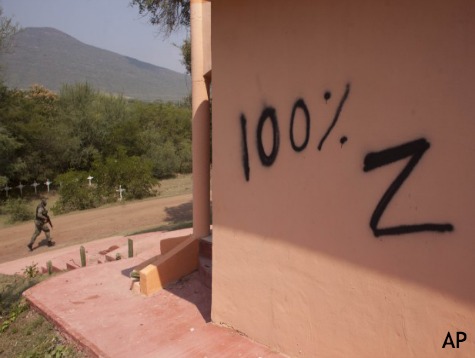Mexican drug cartels, such as the Zetas and the Gulf Cartel, are supplementing their incomes by selling stolen gasoline. At $0.40 a liter, gasoline is cheaper for residents of Tamaulipas than a can of Coca-Cola if they buy from the cartels, helping increase cartel violence while also seriously damaging oil companies in the nation.
According to the Mexican publication Milenio, 15% of gasoline sold in the northeast state of Tamaulipas, which borders central Texas, is controlled and distributed by the Zetas and the Gulf Cartel. The low prices of stolen gas in the region cannot be understated: the paper notes that gasoline is three times cheaper than milk and multiple times cheaper than orange juice. The stolen gasoline is distributed to hundreds through clandestine “gas stations” that consist of pickup trucks loaded with the stolen goods and a garden-variety hose. Customers take the gasoline home via their personal tanks or bottles.
Milenio estimates that the Zetas make 3.5 billion Mexican pesos ($267,000,000) a year on stolen gasoline. They note that, despite the occasional accident or fire associated with the illegal trade, their efficiency in stealing and reselling the gasoline has created a genuine market competitor in the Zetas and Cartel del Golfo. Despite the economy growing 3 to 5% annually, Pemex, which is government-owned, has significantly lost value stake in Tamaulipas because of the efficiency with which the cartels operate a parallel market for gas. Pemex sold 12,000 fewer barrels of oil in 2012 than it did in 2008. Infobae reports that, in 2014, Pemex is expected to lose another $680,000,000 in revenue.
The resurgence of drug cartels in Tamaulipas comes as a shock to many–particularly given that their new lucrative trade is not in drugs, and that they have survived an aggressive offensive by the Mexican government. The Zetas, in particular, have experienced significant losses in the past year. In May, Mexican soldiers killed the founder of the Zetas, Galindo Mellado Cruz, in Tamaulipas. Cruz had not been an active leader in the organization for some time, though responsible for its spread throughout the region during his tenure.
The resurgence of drug cartels in the north raises questions for the more violent Mexican regions in the south, where homicides have skyrocketed and the government has all but given up fighting drug cartels. In Michoacán, a state that experienced a 55% spike in homicides in 2014, drug cartels have taken to killing public office holders to establish their power over the state.
One such public official, Mayor Carlos Salanueva de la Cruz of Ajuchitlán del Progreso, was found dead in a black garbage bag, cut into pieces and left by the side of a highway. De la Cruz is believed to have been captured by the cartel La Familia Michoacana, who received ransom money from his family before his body was found. He is the second public official in the region to meet such a fate this month. Salvador Vega Ramírez, head of the municipal committee of the PRI party in Erongarícuaro, was shot to death in what is believed to be a conflict arising from a particular illicit business dealing.
The Mexican government continues to use all avenues at its disposal to fight drug cartels, even legalizing vigilante groups surfacing in Michoacán as a result of the government’s inefficacy in fighting the violence. The news that cartels have become increasingly innovative in generating income is a cause for concern in the entire country, however, even in regions governed by other cartels, as it sets an example to those not participating in the stolen gasoline trade that the market is open for the taking.

COMMENTS
Please let us know if you're having issues with commenting.